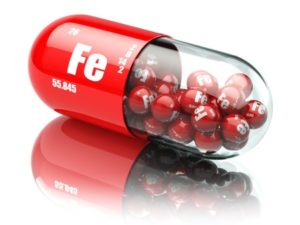How Much Iron is Enough?

Iron is a critical nutrient for you body, and too much or too little can lead to very unpleasant side effects. It’s important to understand how iron contributes to your overall wellness, as well as recognize the signs of iron deficiency. This is especially true if you are pregnant, since your developing child will demand iron as well.
The Role of Iron In the Body
Iron is an essential mineral that helps send oxygen throughout the body. This means that iron plays a vital role in hemoglobin, which is the component of red blood cells that carries oxygen from your lungs and distributes it to different areas of the body. Without enough iron, your body can’t efficiently support the red blood cells necessary for oxygen distribution. As Paul Thomas, a scientific consultant to the National Institutes of Health explains, “If you’re not getting sufficient oxygen in the body, you’re going to become fatigued.” That type of exhaustion doesn’t just make you tired, but also stunts brain function and immune system strength.
The Right Levels of Iron
Your first source of iron is the food that you eat. Lean red meat, pork, poultry, and seafood are all rich in iron, which of course means that vegetarians need to make a concerted effort to eat enough iron. Fortunately, beans, dark leafy greens, dried fruit, and fortified cereals all contain iron as well. Regardless of your age or gender, eating these iron rich foods will help support your body functions.
It is recommended that women actually need more iron than men since they lose a great deal of iron during each month’s menstruation. Between ages 19 and 50, women should get 18 mg of iron while men only need 8 mg. As women reach menopause their iron needs decrease and match that of men. Of course, pregnant and nursing women need more iron to support their babies as well. A doctor is the best person to make specific recommendations regarding pregnancy and nursing, since it changes for each woman.
With the right amount of iron in your food or your chosen supplement, you can continue to help your body thrive. If you suspect you are low in iron, a simple blood test at your doctor’s office can answer that quickly.

